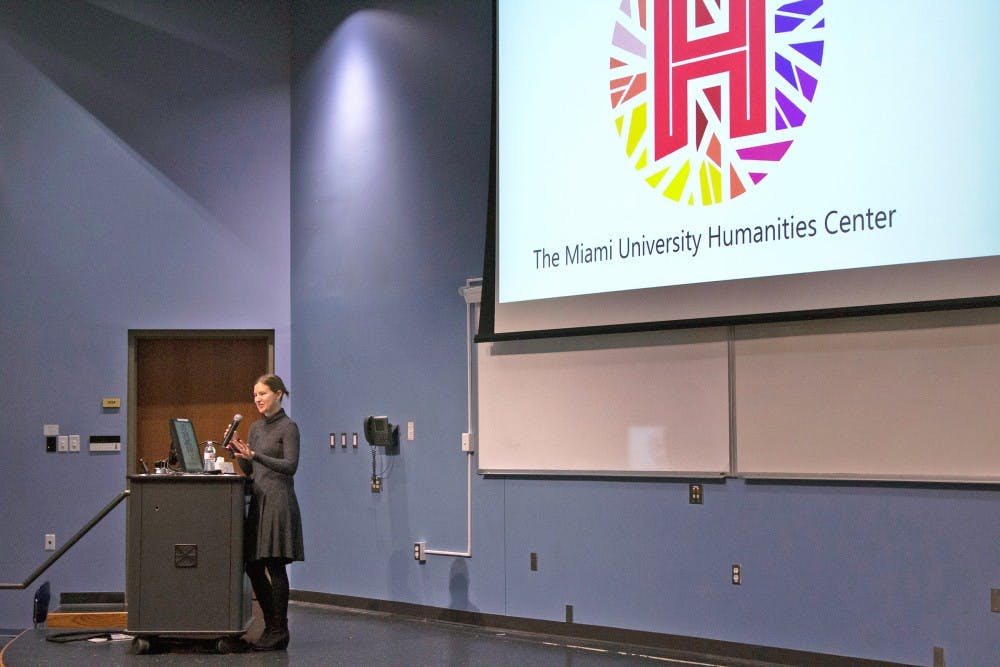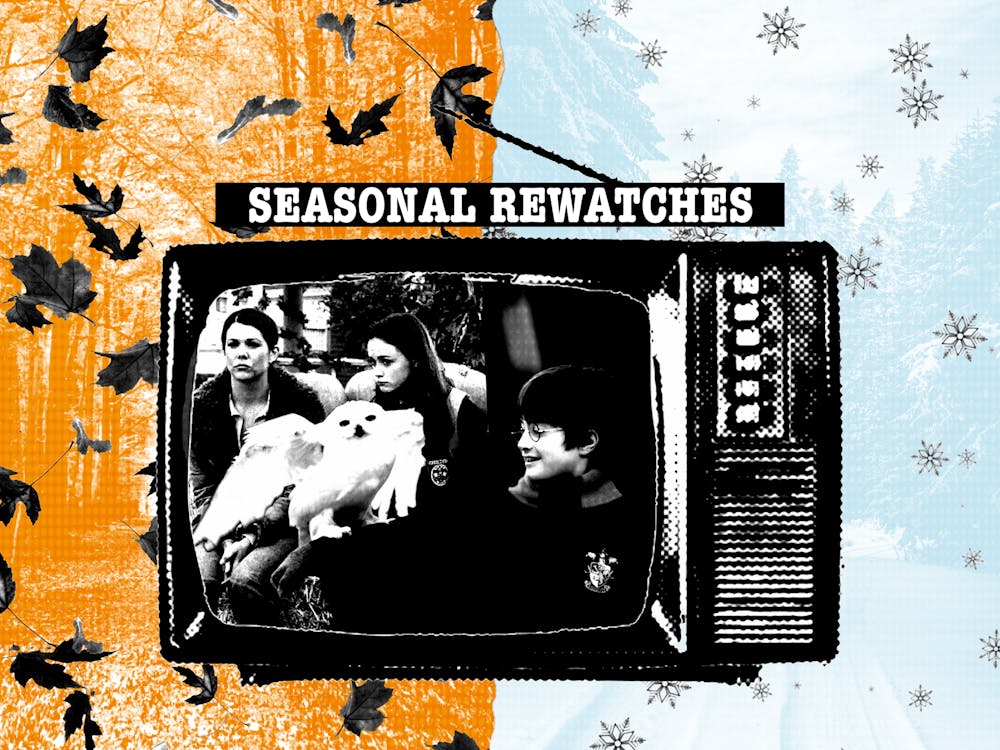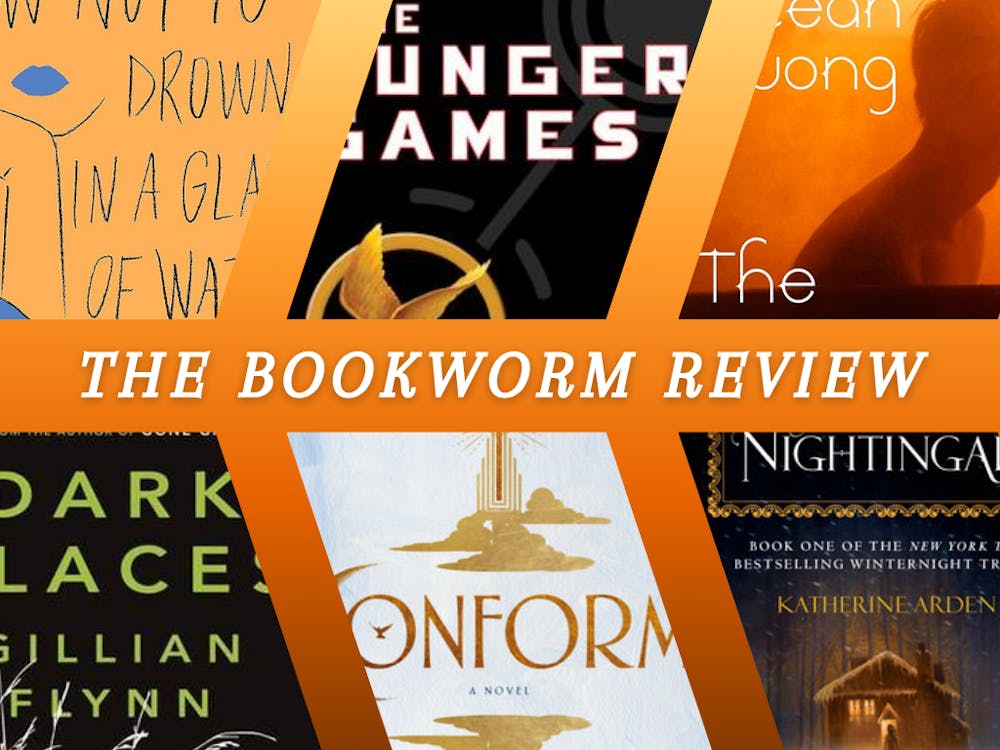While researching her latest book, "On Immunity: An Inoculation," Eula Biss was struck by how many minds it takes to build a body of knowledge, a body vulnerable to distortion.
"When we separate off information or facts from the body of knowledge and isolate them, look at them out of context, a kind of violence can be done to the body of knowledge," Biss said. "It's this dismemberment that results in...true lies, which is information that is technically true, but is nonetheless deeply misleading."
Using "On Immunity" as a backdrop, Biss spoke on Thursday, Feb. 7 in Benton Hall as part of the Humanities Center's Altman Lecture Series. The event was co-sponsored by the Department of English Creative Writing Program and the Department of Media, Journalism and Film.
Fittingly, Biss began her lecture, entitled "Truth, Lies, and True Lies," by coming clean about her biography. She and her husband did not actually found a conceptual band called STET Everything (a joke on writers who shun suggestions from their editors) as her website's bio claims.
Having cleared the air, Biss introduced the concept of "lying in the guise of truth." Coined by philosopher Slavoj \0x017Di\0x017Eek, this phrase describes when prejudices stand in for facts, such as the racist willingness of white America to believe stories of violence in the wake of Hurricane Katrina, or the anti-Semitism in Nazi Germany that perpetuated an alternate truth about Jewish people.
Biss then referenced Kevin Young, author of "Bunk: The Rise of Hoaxes, Humbug, Plagiarists, Phonies, Post-Facts, and Fake News."
"One of the points he makes is that lies work on us because we want to believe them," Biss said. "Many of the hoaxes he writes about were never very convincing, but they filled a need and the need was that people had a desire to be fooled."
The genesis of "On Immunity," Biss said, came from a similar willingness to believe.
Before she started writing about the issue, Biss began researching vaccines for personal reasons. Eight months pregnant, she had questions about the necessity of the Hepatitis B vaccine given to babies within 12 hours of birth.
Biss met with a pediatrician who told her not to worry about the Hep B vaccine, as it was only meant for prostitutes, people from the inner city and those in other at-risk groups.
Initially, Biss was relieved. It wasn't until later that she realized that she lived in one of the country's prominent anti-vaccination pockets -- and that the pediatrician was speaking in racist code.
"What he didn't know is that I was living in a neighborhood in Chicago that was very much what most people mean when they say inner city," Biss said, adding that a blood transfusion after her son's birth also placed her in an at-risk group. "Later, when I reflected on that conversation, I thought that should have given me pause."
Enjoy what you're reading?
Signup for our newsletter
Having written about race in America as the focal topic of her second book, "Notes from No Man's Land: American Essays," Biss said she was ashamed at herself for ignoring the pediatrician's red flags. Biss stopped seeing him and opted for her son to receive the Hep. B vaccine after all, albeit after his birthday.
Since then, Biss has read every piece of vaccination literature she can get her hands on, wishing she had taken more science classes as an undergraduate at Hampshire College.
At an afternoon coffee hour, Biss compared her deep dive into vaccination to her work on an unpublished book about alternative marriages that almost inspired her to become a marriage counselor.
"It can feel like this really swirling whirlpool that, if you keep on going, can lead to the sea," she said.
In her research, Biss noticed one source that was cited across dozens of articles as showing a clear connection between vaccines and autism. Upon reading it, she was surprised that the 1998 study of 12 children was not conclusive and suggested further study.
Andrew Wakefield, one of the now-retracted study's authors, nevertheless held a press conference that stoked the fears of vaccine skeptics and angered his co-authors. Later, Wakefield lost his medical license after the discovery of ethical violations, including a conflict of interest and the medical mistreatment of children.
"After reading his papers and interviews, I didn't find this remotely surprising," Biss said. "You can read a person's ethics in their language and style of thought."
The main reason, Biss said, that there is so much uncertainty around vaccines is the rarity of side effects, let alone fatalities. Complications are almost exclusively limited to young children with weak immune systems who ended up contracting the disease the vaccine is designed to prevent.
"That's why it's hard to say with any degree of certainty whether a reaction is associated with a vaccine or whether it's more like someone died of a heart attack on a bed," Biss said. "It's not the bed's fault, they just happened to be laying on the bed."
Ultimately, Biss said that while readers can generally trust information from magazines and publications that can afford fact-checkers, it is on the reader to investigate cited sources and recognize leaps in logic.
"In practice," she said, "truth and lies are often made from the same source material, the same information, the same facts."
vestalkc@miamioh.edu




